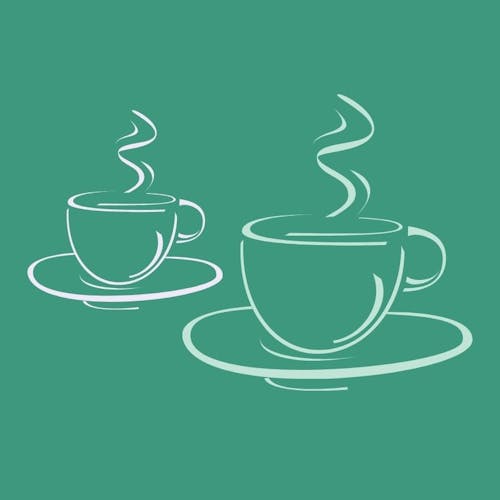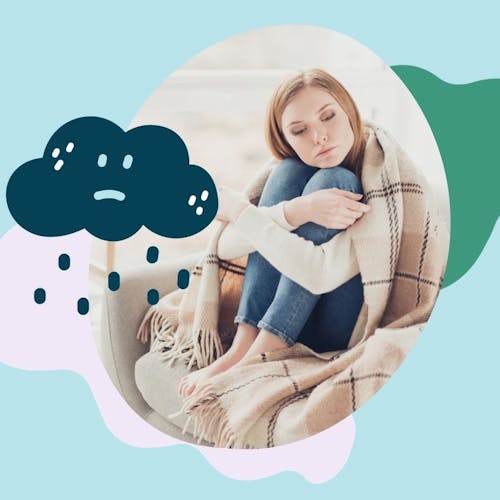This website uses cookies to enhance the user experience. By using Yoppie you are agreeing to our use of cookies.
PMS Crying: Handling It Naturally & Healthily
Written by Yoppie
29 Nov 2021
Why do I cry during PMS?
PMS crying is so embarrassing! How do I stop it?
Should I always hold back the tears??
How do I manage my mood long-term?
My partner cries a lot during PMS. How can I make them feel better?
It isn’t just crying - PMS gives me feelings of depression. What can I do?
It’s happening. Here come the waterworks… again. If you find yourself weeping like it’s the end of Marley & Me, but lacking a legitimate reason, it could be your PMS. This is normal and happens to many people around their period. We’re taking a closer look at why it occurs, how to avoid it (sometimes) and how to cope with it in a healthy way when there’s no stopping it...
Why do I cry during PMS?
Around 75% of people with periods experience a range of PMS symptoms. For some, their burden is cramps, or acne, or sleep problems. For others, it’s all about mood swings - hello unwanted tears! If you feel sad, anxious or irritated by everything around you in the first few days of your period, you’re not alone.
Crying for no reason (even when you weren’t aware you felt sad) can be a tough symptom to handle, particularly when in a challenging environment like a work meeting or party, and the feeling can be intensified by the stress of a situation.
As with many PMS symptoms, it’s all thanks to hormones. When estrogen and progesterone levels drop after ovulation, this also reduces the level of serotonin in our system, which is responsible for regulating our mood, appetite and sleep. Low serotonin levels can lead to feelings of sadness, even if there’s nothing to be sad about, and change our eating and sleeping patterns which can affect our energy levels and mood - it’s a vicious cycle.
PMS crying is so embarrassing! How do I stop it?
Firstly, there’s absolutely nothing to be embarrassed about - crying is a normal human emotion that can actually release feelings of tension and make us feel better. While there is an argument for workplaces being more open to people with periods working around any symptoms they have (yes, crying is a symptom), we also know that you’re typically going to want to avoid crying at random work meetings, social events and other inconvenient places.
Stopping crying is a bit like stopping a sneeze - sometimes if it’s got to come out, it’s got to come out! However, you can try these tips to stop it:
- Turn off Adele, for starters
- Take a few deep breaths to calm yourself and lower your stress levels
- Leave a stressful situation or conversation, and take a few minutes alone to collect your thoughts
- Make a power stance (you know, like Wonder Woman) to help you feel more in control and confident. This may sound silly, but there is research to support the idea that ‘power posing’ makes a big difference to your hormones and how you feel
- Communicate with the person who has triggered your tears. Sometimes lack of ability to express how you’re feeling can make you frustrated, so turn your tears into words and make it clear what you want and need from the people around you
- Go for a walk or do some exercise to raise endorphins and counteract feelings of sadness
Should I always hold back the tears??
Absolutely not! Let it out! Go full Bridget Jones. There are actually benefits to crying: a 2014 study found that crying can have a self-soothing effect, activating the parasympathetic nervous system (PNS) which is responsible for relaxation. Further research found actually shedding tears releases oxytocin and endorphins, which helps reduce pain, promote wellbeing and improve sleep.
How do I manage my mood long-term?
If your mood fluctuates through the month and you need a long-term solution for excessive crying, there are lifestyle changes that could help regulate your hormones and mood:
- Avoid junk food and switch to foods that can reduce feelings of depression, like fish rich in omega-3 fatty acids
- Exercise regularly to boost endorphins and improve mood. Try to do this often to maintain a stable mood
- Laugh regularly. Scheduling time with friends or doing activities that make you feel good can really help. Watch a funny movie, join a dance class, whatever will give you that happiness boost to sustain you through the low mood spells
- Reduce stress levels with activities like meditation and yoga, to boost serotonin and increase feelings of wellbeing
- Focus on your nighttime routine to improve sleep, which has a huge effect on mood. Avoid caffeine, turn off screens an hour before bed, and read to wind down
My partner cries a lot during PMS. How can I make them feel better?
Excessive or uncontrollable crying can be a frustrating symptom for the person it’s happening to, and for others around them. It’s important for your partner to know their feelings are valid and being heard, even if they’re PMS-related. Listen to what’s bothering them, do what you can to help relieve their stress, and encourage them to take steps to feel better, like getting an early night, doing an activity together to boost their mood, or just giving a simple hug - research shows hugs can boost oxytocin, so don’t be stingy on the cuddles!
It isn’t just crying - PMS gives me feelings of depression. What can I do?
There is a difference between harmless crying spells and depression. Depression can be a serious health concern that should be addressed by a professional, so if your mood feels permanently low and you struggle to improve it through the methods above, seek help from your GP. This may involve counselling, medication or other methods, so always remember there are options to help get you back to feeling like yourself.
Do you have questions about PMS crying? Our Full Stop FB group is a private, inclusive place where you can get real about the embarrassing symptoms of PMS, or you can always DM us on Instagram at @itsyoppie to ask whatever’s on your mind. Don't forget that our personalised menstrual care subscription can get organic tampons, PMS supplements and much more delivered easily and regularly through your letterbox, so that's one pretty darn big load off your mind.
Section jump
Back to top
Subscribe To Our Newsletter
YOPPIE





© 2026 Yoppie is a registered trademark of Phlo Technologies Ltd.
Yoppie's supplements are not a substitute for a varied diet and healthy lifestyle and are not intended to diagnose, treat, or cure any disease. If you are pregnant, breastfeeding, have a medical condition or are under medical supervision, please consult with your doctor before taking any of our products.






